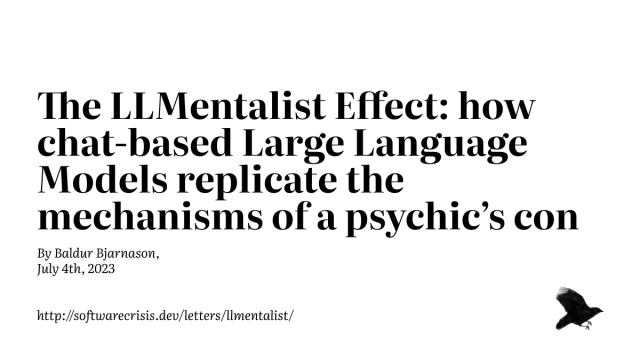“The LLMentalist Effect: how chat-based Large Language Models replicate the mechanisms of a psychic’s con” by @baldur
softwarecrisis.dev/letters/llm…
It is a long read but I feel does a good job of discussing how LLMs are more interested in truthiness than admitting when they don’t know.

The LLMentalist Effect: how chat-based Large Language Models rep…
The new era of tech seems to be built on superstitious behaviourOut of the Software Crisis
This entry was edited (2 years ago)
Adrian Roselli, pH0
in reply to Adrian Roselli, pH0 • • •Here @eevee does a good job breaking down how users *thinking* an LLM response is good is *not* the same as the response being good (nor correct):
github.com/mdn/yari/issues/923…
(As before, please refrain from piling on in the comments.)
The AI help button is very good but it links to a feature that should not exist · Issue #9230 · mdn/yari
GitHubAdrian Roselli, pH0
in reply to Adrian Roselli, pH0 • • •Last month I argued why ‘AI’ will not fix #accessibility:
adrianroselli.com/2023/06/no-a…
As if to prove my point, #UserWay launched a broken LLM:
FuxMyCode.ai/
Yet the sorta-press shills nonsense like this PR from #AudioEye:
web.archive.org/web/2023070315…
Pay attention to who promotes LLMs as a solution. Usually it is a money play or laziness.
#a11y
AudioEye Shares Results Of AI And Accessibility Study, Says It ‘Illustrates Tremendous Potential’ For Responsible Use
Steven Aquino (Forbes)